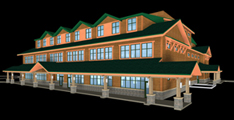welcome to j. david maino's ae senior thesis e-portfolio
Reflection
ABET Outcome Survey
|
ABET
Outcomes for AE
481W/482 |
Outcome not able to be assessed (Score
of 0) |
Level of ability demonstrated but below acceptable (Score
of 1) |
Minimum acceptable level of ability demonstrated (Score
of 2) |
More than minimum level of ability demonstrated (Score
of 3) |
|
a. An ability to apply knowledge of mathematics,
science, and engineering |
- |
- |
- |
X |
|
b. An ability to analyze and interpret data |
- |
- |
- |
X |
|
c. An ability to design a system, component, or
process to meet desired needs |
- |
- |
X |
- |
|
e. An ability to identify, formulate, and solve
engineering problems |
- |
- |
- |
X |
|
f. An understanding of professional and ethical
responsibility |
- |
- |
- |
X |
|
g. An ability to communicate effectively |
- |
- |
X |
- |
|
h. The broad education necessary to understand the
impact of engineering solutions in a global and societal context |
- |
- |
X |
- |
|
i. An ability to engage in
life-long learning |
- |
- |
- |
X |
|
j. A knowledge of contemporary issues |
- |
- |
- |
X |
|
k. An ability to use the techniques, skills, and
modern engineering tools necessary for engineering practice |
- |
- |
- |
X |
|
o. Engineering design capabilities in at least two
(2) of the (3) basic curriculum areas of architectural engineering, and that
design has been integrated across the breadth of the program |
- |
- |
X |
- |
|
p. Communication and interaction with other design
professionals in the execution of building projects |
- |
- |
X |
- |
AE 481W/482 Course Reflection
The summer internship I had with Integrated Design Associates during the summer of 2005 provided me the opportunity to use the Tahoe Center for Environmental Sciences as my thesis building. I was drawn to the building because of its unique features and systems. From a sustainability perspective it was interesting to me because the building not only has the opportunity to be as environmentally friendly as possible, but also to study sustainability in the Lake Tahoe basin as it is intended to be a research facility. The architect, owner, and engineers all were very supportive of me using this building for my thesis as it would allow for further study as to how sustainable the building itself could be.
Upon returning to campus, I quickly realized that thesis, and especially this building in particular, would require a good deal of my time. The uniques systems in found TCES often led to interesting methods of investigation and unusual solutions to even more unusual problems. It was challenging, and at the same time a lot of fun. I got a chance to work on a whole slew of systems that I would rarely ever get to work on individually, let alone together (try finding another building with photovoltaics, solar hot water heating, cogeneration, and radiant floor and ceiling panels that is going for a LEED platinum rating!). Because of this, many different options for redesign were considered and discarded due to the shear complexity of the systems. Opportunities presented themselves along the way that allowed me to "field test" such ideas, including a trip to Lutron for presentations, speaking with industry professionals and advisors, and numerous visits to faculty here at Penn State that were all beneficial when it came down to deciding the best approach to redesigning the building. Because of the AE program, I had more than enough knowledge in each field to perform reasonable analyses and get accurate results, but what was even more helpful was the ability that the AE program has given me to be able to bridge the professional gap that often occurs between disciplines. Because of that I was able to talk intelligently with people in different sectors of the industry about their various specialty areas, and in turn I think I produced better results.
Overall, thesis was a very positive experience for me. Stressful and frustrating at times, but beneficial. I can't even begin to explain how much I learned not only about individual building systems, but also about the design process in general. It was extremely satisfying to see my work compiled and printed into a nice, thick booklet for everyone to see. It will also be nice to have as a reference and a reminder of what I did and what options I explored. I'm sure in time I'll look back and see how silly some of the systems I designed really were, but those are the sorts of things that only experience can fix, and I think after going through thesis, I have definitely begun acruing the experience I will need in the building industry.
CPEP & Discussion Board Reflection
My CPEP site has been extremely useful in distributing information to faculty and professionals, and has been an invaluable tool that I have been using to keep track of my progress and milestones. All of my assignments can be found herein and news items from throughout the year were posted to provide viewers an idea of the progress being made on my thesis.
The discussion board provided was also very useful. I only ended up using it once when inquiring about PV costs, but responses were quick and helpful. I was surprised that some of my fellow students even commented and lent their knowledge and help. The discussions that I saw on the board seemed very professional and everyone seemed to get their questions answered in a reasonable amount of time.

